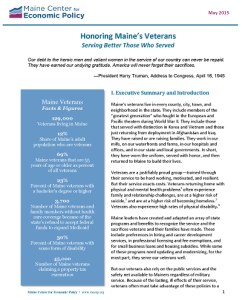“Despite the honors society accords veterans, they remain a group requiring policymakers’ considered and targeted attention―both to ensure that state programs are responsive and innovative, and to protect federal anti-poverty programs that benefit veterans in Maine. Maine leaders have created and adapted an array of state programs and benefits to recognize the service and the sacrifices veterans and their families have made. But our veterans also rely on the public services and the safety net available to Mainers regardless of military service. This is especially the case for our most vulnerable, disabled veterans and those veterans who live in rural parts of the state.”
Recommends improving veterans’ access, eligibility, and benefit levels for health care, nutrition assistance, higher education, and housing support
Augusta, Maine (Thursday, May 7, 2015) The Maine Center for Economic Policy (MECEP) today released a new report, Honoring Maine’s Veterans:Serving Better Those Who Served. MECEP graduate intern and Iraq war veteran Hal Brewster served as the report’s lead author. The report presents findings from research and analysis of the state programs and services Maine provides to its 129,000 veterans. It recommends five policy changes to improve access, eligibility, and benefit levels for health care, nutrition assistance, higher education, and housing support for our veterans.
“Despite the honors society accords veterans, they remain a group requiring policymakers’ considered and targeted attention―both to ensure that state programs are responsive and innovative, and to protect federal anti-poverty programs that benefit veterans in Maine,” Brewster writes. “Maine leaders have created and adapted an array of state programs and benefits to recognize the service and the sacrifices veterans and their families have made. But our veterans also rely on the public services and the safety net available to Mainers regardless of military service. This is especially the case for our most vulnerable, disabled veterans and those veterans who live in rural parts of the state.”
Specifically, MECEP recommends that Maine policymakers:
- Accept federal funds to expand Medicaid under the Affordable Care Act to support Maine veterans and their families who have no health insurance.
- Waive the work requirement for Supplemental Nutrition Assistance Program recipients to keep Maine veterans food secure, especially those struggling to find jobs in Maine’s high-unemployment, rural areas.
- Adjust university-level credit transfer policies and provide state appropriations to fully fund the state National Guard Tuition Assistance
Program to improve the rate of Maine veterans with bachelor’s degrees. - Increase the Property Tax Fairness Credit cap from $600 to $900 for all veterans to help elder veterans stay in their homes, encourage younger veterans to buy homes, and support veteran renters.
- Modernize and streamline Maine’s veterans’ program administration to enable veterans to access more information and services over the Internet and to more closely mirror military operations.
 “Maine’s veterans live in every community in our state and run the gamut from surviving members of the ‘greatest generation’ of World War II to those now returning from Afghanistan and Iraq,” said MECEP Executive Director Garrett Martin. “They served with courage and honor to protect our nation from harm, too often at great personal sacrifice. They have earned not only our gratitude and respect but our commitment to deliver on the promises we made when they joined the the nation’s Armed Forces.”
“Maine’s veterans live in every community in our state and run the gamut from surviving members of the ‘greatest generation’ of World War II to those now returning from Afghanistan and Iraq,” said MECEP Executive Director Garrett Martin. “They served with courage and honor to protect our nation from harm, too often at great personal sacrifice. They have earned not only our gratitude and respect but our commitment to deliver on the promises we made when they joined the the nation’s Armed Forces.”
Martin added that there are bills currently pending in the legislature that address issues related to several of the recommendations in MECEP’s report, including L.D. 1343, An Act to Increase Access to Postsecondary Education for Maine National Guard Members and L.D. 633, L.D. 808, and L.D. 854, bills to authorize accepting federal health care funds.
“Accepting federal funds would make health care available to 2,700 uninsured Maine veterans and 1,000 of their family members,” Martin said. “Maine veterans are less likely to have a four-year college degree than non-veterans, despite successful implementation of the post-9/11 GI Bill. Providing additional tuition assistance to National Guard members would bring Maine into line with tuition benefits offered by Massachusetts, Connecticut, and New Hampshire to their National Guard members.“
Hal Brewster received a law degree from the Georgetown University Law Center while pursuing a master’s in public affairs from Princeton University. He served in the U.S. Army’s First Infantry Division based in Fort Riley, Kansas. Hal deployed to Iraq where he served first as an intelligence officer and later as a scout and sniper platoon leader. He left active duty in 2010 with the rank of captain.
For a copy of Honoring Maine’s Veterans: Serving Better Those Who Served, click here.
For a copy of the report’s executive summary, click here.


